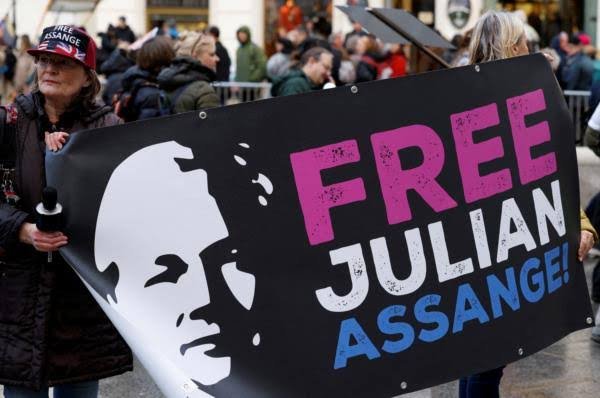US Reportedly Considering Plea Deal Offer For Julian Assange – The US government is reportedly contemplating a plea deal for Julian Assange, enabling him to acknowledge a misdemeanor. However, his legal team claims they have received no signals indicating a shift in Washington’s stance.
According to The Wall Street Journal’s Wednesday report, the US Justice Department is exploring options to expedite the prolonged legal battle in London involving the WikiLeaks founder’s extradition to face espionage charges for publishing classified US documents related to the Afghanistan and Iraq wars fourteen years ago.
The report suggested that one option being considered is to dismiss the existing 18 charges under the Espionage Act if Assange agrees to plead guilty to a misdemeanor offense of mishandling classified documents. Assange could remotely enter the plea from London and would probably be released shortly after the deal is finalized, given his five years of prior custody in the UK. Yet, Assange’s legal team expressed their lack of awareness regarding any shift in the prosecution’s strategy.
People Also Read: New York City Mayor Eric Adams Faces Sexual Assault Lawsuit
One of Assange’s defense attorneys, Barry Pollack, said in a statement: “It is inappropriate for Mr Assange’s lawyers to comment while his case is before the UK high court other than to say we have been given no indication that the Department of Justice intends to resolve the case and the United States is continuing with as much determination as ever to seek his extradition on all 18 charges, exposing him to 175 years in prison.”
The high court is anticipated to make a decision within the coming weeks regarding whether to grant Assange an additional opportunity to appeal his extradition. Assange, currently detained in the high-security Belmarsh prison, was reportedly too unwell to attend the recent hearing at the Royal Courts of Justice last month.
Should the two judges rule unfavorably, Assange would have exhausted all available UK avenues for contesting the extradition, leaving him with the European Court of Human Rights as the last recourse. This court could potentially instruct the UK to halt the extradition process until the case is heard. If unsuccessful, Assange could be transferred to the US within a matter of days.
Assange’s extradition poses political challenges for the Biden administration, especially during an election year. The prior Democratic administration, led by Barack Obama, opted against charging Assange due to concerns that such action would violate the First Amendment, protecting freedom of the press. In 2019, the Trump administration pursued charges under the 1917 Espionage Act, aiming to distinguish traditional journalism from Assange’s activities.
People Also Read: Judge Rejects Bob Menendez’s Legislative Immunity Claims
Prosecutors claim that Assange knowingly facilitated the publication of leaked confidential documents, posing a risk to lives. In a hearing on Assange’s permission to appeal in February, his defense lawyers argued he could be targeted by US state agencies for “extra-legal attack elimination” if he were extradited, particularly given “the real possibility of a return of a Trump administration”.




